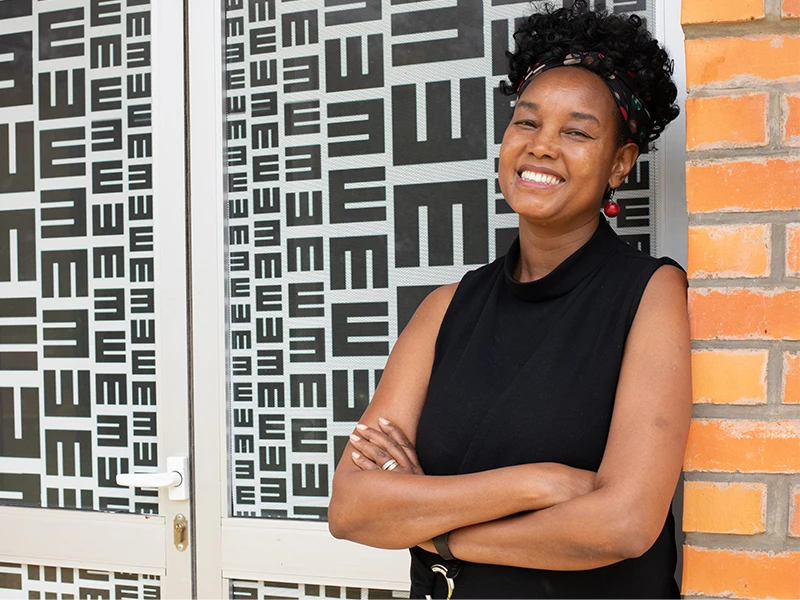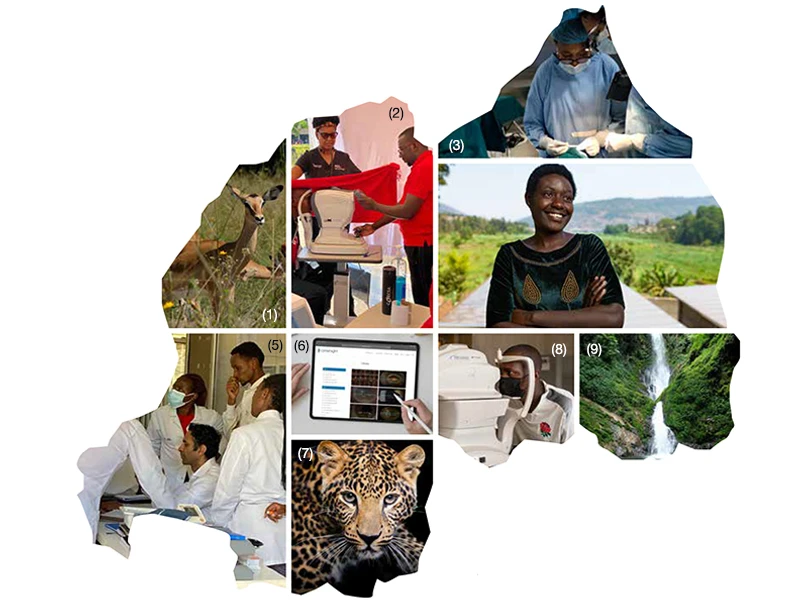Harsha S. Reddy, MD, has a passion for global ophthalmology that has led him to countries as distant as India, Nepal, and Ethiopia—devoting his personal time to serving on medical trips. When New York Eye and Ear Infirmary of Mount Sinai (NYEE) recently granted him an extended sabbatical leave to spread his considerable knowledge and skills in oculoplastics and orbital reconstructive surgery to Rwanda, an east-central African country devoid of that desperately needed specialty, he leapt at the opportunity.
In just a brief period, his impact and footprint are already visible. “Very few people have the professional and cultural commitment of Harsha to build something of the magnitude he has, and see it through to completion,” says Hunter Cherwek, MD, Vice President of Clinical Services and Technologies at Orbis International, a global nonprofit that trains, mentors, and inspires eye care professionals in places with the greatest need for them. “I love the fact we’ve been able to globalize his incredible teaching skills so that those who need them the most can truly benefit.”
Dr. Reddy, Director of the Ophthalmology Residency Program at NYEE, is a volunteer faculty member for Orbis, part of a global force of more than 400 medical experts from more than 30 countries who share their skills with local eye care teams. In that role, Dr. Reddy designed a blended learning curriculum for Orbis that consists of digital instruction on Cybersight—Orbis’ telemedicine platform, which offers eye care teams around the globe free virtual access to world-leading ophthalmic training developed by international medical experts—as well as on-site reinforcement and follow-up training.
The curriculum he designed, edited, and refined in collaboration with Cybersight experts consists of four modules covering the majority of oculoplastic soft tissue surgery through 800 slides and hundreds of photos, images, and videos. This online resource, designed to be a practical manual to bring surgeons-in-training to the functional level of an early-stage oculoplastics fellow, is now available free to ophthalmologists in low- and middle-income countries.
Content development, though, is only part of Dr. Reddy’s ambitious agenda. He spent a month as a visiting faculty member at the Rwanda International Institute of Ophthalmology delivering hands-on instruction encompassing wet lab, lectures, and actual surgeries. “I’d spend mornings doing didactics with the trainees, and afternoons doing wet labs and live surgery at their side, often meeting with them individually to assess their skills,” Dr. Reddy recalls. “The goal was not to teach the complex surgeries right away, but to start with basics like suturing and offer them tips on how to improve their fundamental techniques. I loved working with the trainees who were hungry to learn and extremely motivated.”
There could hardly be a greater need for the skill set Dr. Reddy was eager to impart. Rwanda, a country of breathtaking scenery just south of the Equator, has not a single oculoplastic surgeon to serve 14.5 million people.

Ciku Mathenge, MBChB, PhD, MSc
“Having no specialists makes it very difficult to teach this subspecialty to residents,” says Ciku Mathenge, MBChB, PhD, MSc, Director and Co-Founder of the Rwanda International Institute of Ophthalmology (RIIO), a nonprofit eye care organization that provides training, research, and community services in the region. “We have a lot of trauma cases that need reconstruction, many lid and conjunctival mass problems, orbital tumors that no one has the skills to fix, and a growing demand for correction of age-related lid problems.”
Looking back at her experience with Dr. Reddy and the Cybersight initiative, Dr. Mathenge is quick to acknowledge, “Dr. Reddy filled a huge gap for us, and his teaching impacted the knowledge and skills of not just trainees, but also the faculty. I personally learned two new procedures from him.”
What could Dr. Reddy’s contribution mean for patients? “With good oculoplastic training, we will be able to graduate more comprehensively trained surgeons who will be able to provide basic oculoplastic care in the district hospitals,” explains Dr. Mathenge, whose legacy includes transforming a public eye clinic in Kenya into one of the best-run facilities in the region. “For a patient with conjunctival squamous cell carcinoma or a child with retinoblastoma who needs an enucleation, professional care and management could mean life instead of death. For a child with a disfiguring condition, it could mean being able to attend school, rather than hiding at home.”

(1), (7) and (9): Rwanda is known for its abundant wildlife
and natural beauty.
(2): Dr. Mathenge performing an eye screening on a patient.
(3): Dr. Reddy with trainees in the OR.
(4): A female patient at the Rwanda Diabetes Association clinic for a diabetic retinopathy screening.
(5): Dr. Reddy conducting a wet lab demonstration for trainees.
(6): Cybersight Library on an iPad.
(8): A male patient getting an eye exam at the RIIO-Kibagabaga Community Eye Clinic.
Which is precisely the reason Dr. Reddy remains unswervingly devoted to global outreach, despite a hectic schedule at NYEE, where he leads the nation’s largest residency program and has an active clinical and surgical schedule as Director of Oculoplastic, Orbital, and Reconstructive Surgery, and Director of the Department of Ophthalmology at Mount Sinai Beth Israel. “There is so much need, and we’re just scratching the surface in terms of what can and needs to be done,” he reflects. “We’ve made a good start. Nothing this comprehensive for beginning or intermediate oculoplastics distance learning exists anywhere in the world.”
At the same time, Dr. Reddy’s sabbatical and carefully curated Orbis project could potentially be a building block for a global education program spearheaded by both NYEE and Orbis International. Characteristically, Dr. Reddy signals his eagerness to take on the challenge.
“The goal is to develop a global health presence within our Department of Ophthalmology,” he states, “and I envision our own residents becoming involved in this outreach in a culturally sensitive way, where they benefit from learning how ophthalmology operates in other parts of the world.”
